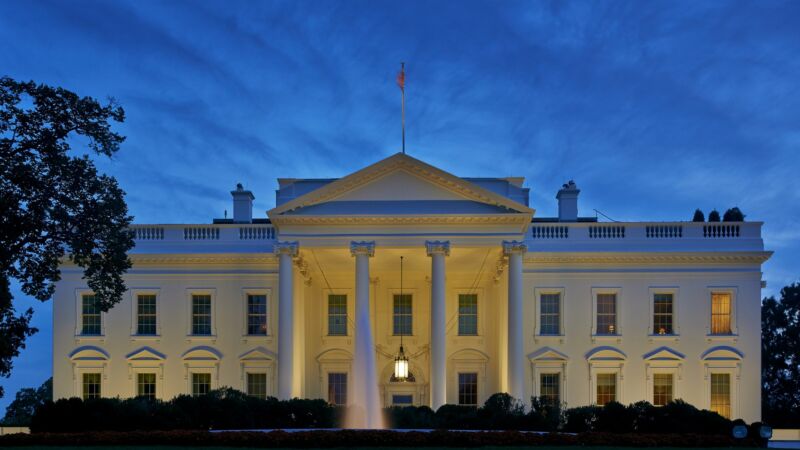The White House has its own pharmacy—and, boy, was it shady under Trump

The White House has its own pharmacy that, until recently, could perhaps best be described as a hot mess, according to a recent investigation report from the Department of Defense’s Office of the Inspector General.
For years, the White House Medical Unit, run by the White House Military Office, provided the full scope of pharmaceutical services to senior officials and staff—it stored, inventoried, prescribed, dispensed, and disposed of prescription medications, including opioids and sleep medications. However, it was not staffed by a licensed pharmacist or pharmacy support staff, nor was it credentialed by any outside agency.
The operations of this pseudo-pharmacy went as well as one might expect, according to the DoD OIG’s alarming investigation report. The investigation was prompted by complaints in May 2018 alleging that an unnamed “senior military medical officer” was engaged in “improper medical practices.” This resulted in the OIG’s investigation, which included 70 interviews of military office officials who worked in the White House between 2009 and 2018 and covers the office’s activity until early 2020. However, the investigation heavily focused on prescription drug records and care between 2017 and 2019 during the Trump administration.
During that time, staff at the White House pharmacy kept handwritten records of prescriptions, the OIG found. The records frequently contained errors in medication counts, illegible text, crossed-out text, and lacked medical provider and mandatory patient information. The pharmacy let White House staff pick up over-the-counter drugs from open bins, in violation of Navy medical regulations. It didn’t dispose of controlled substances properly, increasing the risk of diversion. Staff provided prescriptions without verifying patients’ identities, and provided prescriptions to people who were ineligible for care. And it dispensed pricey brand name products freely, rather than generic equivalents that are considerably cheaper—also a violation of regulations.
In one interview, a White House pharmacy staff member said an unnamed doctor asked “if I could hook up this person with some Provigil as a parting gift for leaving the White House.”
Provigil is a drug that treats excessive tiredness and is typically used for patients with narcolepsy, sleep apnea, and other sleep disorders. Brand-name Provigil is 55 times more expensive than the generic equivalent. Between 2017 and 2019, the White House pharmacy spent an estimated $98,000 for Provigil. In that same time frame, it also spent an estimated $46,500 for Ambien, a prescription sedative, which is 174 times more expensive than the generic equivalent. Even further, the White House Medical Unit spent an additional $100,000 above generic drug cost by having Walter Reed National Military Medical Center fill brand-name prescriptions.
White House baggies
Another White House pharmacy staff member gave clues as to what the staff was doing with those brand name prescriptions. The staffer told OIG investigators that ahead of overseas trips, the staff would prepare packets of controlled medications to be handed out to White House staff. “And those would typically be Ambien or Provigil and typically both, right. So we would normally make these packets of Ambien and Provigil, and a lot of times they’d be in like five tablets in a zip‑lock bag. And so traditionally, too, we would hand these out. . . . But a lot of times the senior staff would come by or their staff representatives . . . would come by the residence clinic to pick it up. And it was very much a, ‘hey, I’m here to pick this up for Ms. X.’ And the expectation was we just go ahead and pass it out.”
In addition to the excessive costs of Ambien and Provigil, the White House Medical Office may have spent hundreds of thousands of dollars on health care for ineligible staff members. White House Medical Unit senior officials estimated that its Executive Medicine clinic has 60 enrolled patients, but it provided care for 6,000 employees, potentially billing the DoD. Between 2017 and 2019, officials also offered senior government officials a patient category code for care at Walter Reed, such that the facility was unable to properly bill them. In the three years, Walter Reed waived over $496,000 in outpatient fees because of these patient categories.
Overall, the OIG concluded that “all phases of the White House Medical Unit’s pharmacy operations had severe and systemic problems due to the unit’s reliance on ineffective internal controls to ensure compliance with pharmacy safety standards.”
The report does not mention Rear Admiral Ronny Jackson, who served as the physician to the president from 2013 to 2018 under both Barack Obama and Donald Trump. Stat, which first reported on the OIG’s new report, noted that Jackson had been accused of fostering a toxic work environment, engaging in alcohol-fueled misconduct, and misusing Ambien, specifically. OIG received those allegations during the first part of 2018, around the same time when the pharmacy complaints came in. And some of the allegations against Jackson were confirmed by a separate OIG investigation released in 2021.
Though a draft of the new report on the White House pharmacy was completed in 2020, it sat under review in the White House Military Office until July 2023.
The OIG laid out a series of recommendations for establishing oversight of the White House pharmacy, create policy to determine staff eligibility, and pharmaceutical oversight. DoD officials have agreed to the recommendations and are working to implement them, the OIG report noted.
https://arstechnica.com/?p=1998430